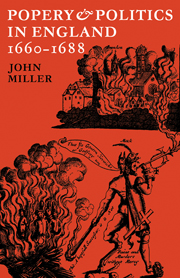Book contents
- Frontmatter
- Contents
- Preface
- Abbreviations
- Note on spellings and dates
- Introduction
- 1 The Catholic laity
- 2 England and Rome: the Catholic clergy
- 3 The penal laws and their enforcement
- 4 The development of the anti-Catholic tradition
- 5 The Restoration settlement and after
- 6 The French alliance and ‘Catholicity’
- 7 York and Danby
- 8 The Popish Plot and the Exclusion Crisis
- 9 The Tory reaction
- 10 James II and the Church of England Men
- 11 James II and the Dissenters
- 12 James II and Rome
- 13 The missionary effort under James II
- 14 The opposition to James II
- Appendices
- Select Bibliography
- Index
- Frontmatter
- Contents
- Preface
- Abbreviations
- Note on spellings and dates
- Introduction
- 1 The Catholic laity
- 2 England and Rome: the Catholic clergy
- 3 The penal laws and their enforcement
- 4 The development of the anti-Catholic tradition
- 5 The Restoration settlement and after
- 6 The French alliance and ‘Catholicity’
- 7 York and Danby
- 8 The Popish Plot and the Exclusion Crisis
- 9 The Tory reaction
- 10 James II and the Church of England Men
- 11 James II and the Dissenters
- 12 James II and Rome
- 13 The missionary effort under James II
- 14 The opposition to James II
- Appendices
- Select Bibliography
- Index
Summary
In the reign of Charles II only a small minority of the population of England was Roman Catholic. This minority had owed its survival after the Reformation to the firmness in the faith of the Catholic nobility and gentry, who provided most of the financial support for the priesthood and many of its members. The Catholic community under Charles II was much as it had been at the end of Elizabeth's reign and much as it was to remain until the massive Irish immigrations at the time of the Industrial Revolution. It was primarily aristocratic and rural and it depended on priests trained in seminaries abroad. There were fearsome laws in force against all aspects of Catholic life, but they were enforced comparatively little except in times of crisis. Most Protestant magistrates showed a considerable practical tolerance in their dealings with their Catholic neighbours.
In view of this it may seem surprising that the politics of the period 1660–88 should have been dominated by a violent and often hysterical anti-Catholicism. One must seek the explanation of this apparent anomaly in the religious policies of Charles II and even more in the conversion to Catholicism of James, duke of York, the king's brother and heir-apparent, who eventually succeeded to the throne as James II. In the early part of Charles's reign English anti-Catholicism was latent but far from dead. The attitude to Catholicism of English Protestants had been formed by their interpretation of a century and more of religious conflict since the Reformation.
- Type
- Chapter
- Information
- Popery and Politics in England 1660–1688 , pp. 1 - 2Publisher: Cambridge University PressPrint publication year: 1973



